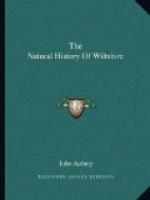Inthe county of Surrey, and
FLYNTSHIRE.
By
Mr. John Aubrey, R.S.S.
1685.
Psalm 92, v. 5, 6. “0 Lord, how glorious are Thy workes: Thy thoughts are very deep. An unwise man doth not well consider this: And A fool doth not understand it.”
Psalm 77, v. 11.
“I will remember the workes
of the lord: And call
to mind Thy Wonders of old
time.”
GratiiPALISCI Cynegeticon.
“O rerum PRUDENS quantum EXPERIENTIA
vulgo
MATERIEM LARGILIA Boni, si VINCERE CURENT
DESIDIAM, et GRATOS AGITANDO PREBENDERE Fines
!
------- Deus AUCTOR, et ipsa
AREM ALUIT Natura suam.”
=========================================================
===========
To
Theright honourable
Thomas, earle of Pembroke and MONTGOMERIE,
LordHerbert of CAERDIFFE, &c.;
Oneof the privy councell to their
majesties,
and
President of the royall Societie.
[A page is appropriated in the manuscript to the Author’s intended dedication ; the name and titles of his patron only being filled in, as above.
The nobleman named is particularly mentioned by Aubrey in his Chapter on “The Worthies of Wiltshire”, printed in a subsequent part of this volume. He was Earl of Pembroke from 1683 till his death in 1733; and was distinguished for his love of literature and the fine arts. He formed the Wilton Collection of marbles, medals, and coins; and succeeded John, Earl of Carbery, as President of the Royal Society, in November, 1689.- J. B.]
=========================================================
===========
Preface.
Till about the yeare 1649,* ’twas held a strange presumption for a man to attempt an innovation in learning; and not to be good manners to be more knowing than his neighbours and forefathers. Even to attempt an improvement in husbandry, though it succeeded with profit, was look’t upon with an ill eie. “Quo non Livor abit?" Their neighbours did scorne to follow it, though not to do it was to their own detriment. ’Twas held a sinne to make a scrutinie into the waies of nature; whereas Solomon saieth, “Tradidit mundum disputationibus hominum”: and it is certainly a profound part of religion to glorify god in his workes.




